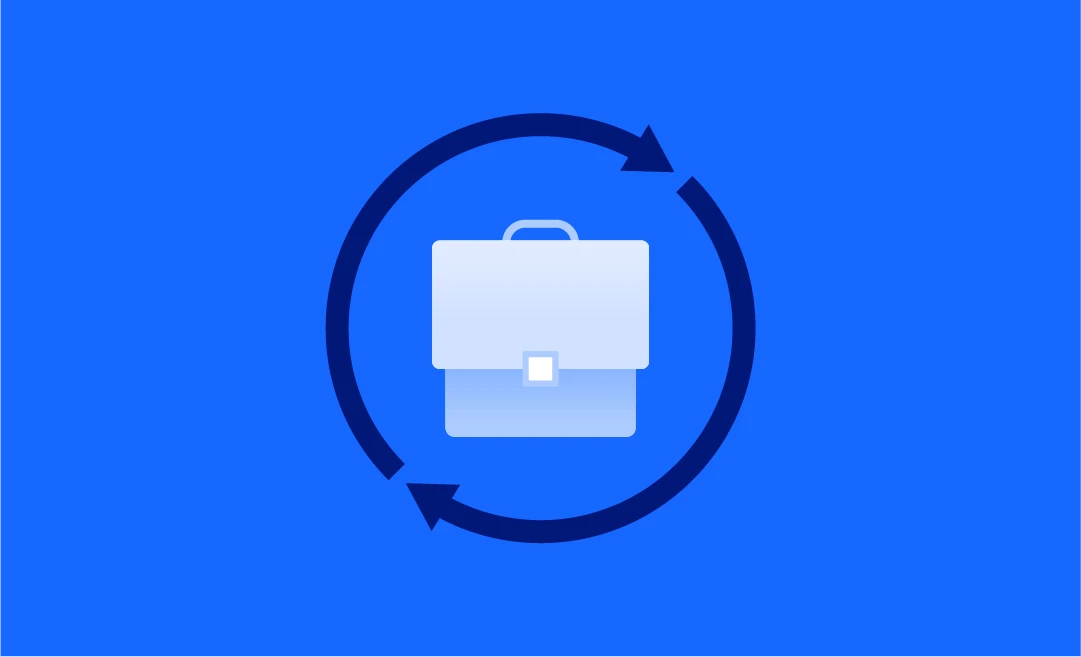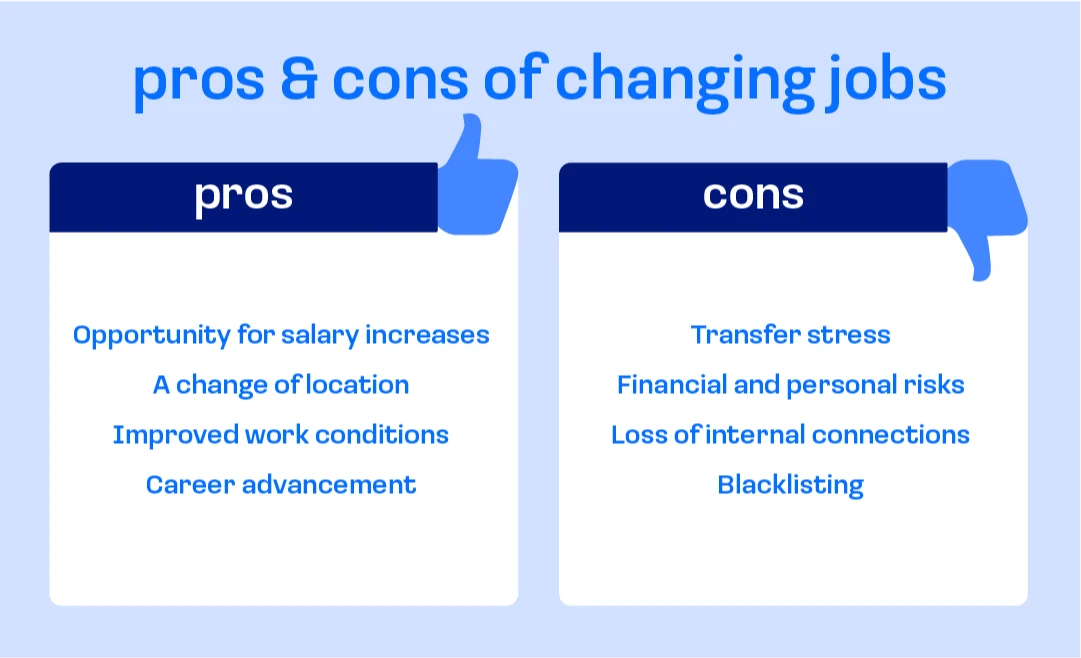Advantages and Disadvantages of Changing Jobs: Weighing the Trade-Offs of the New Career
The author of this article is tech expert Pieter Murphy.

It might be time for a new job. Sure, no one wants to upend their current work life, but the average worker makes a career change every 4.1 years. And 64% of American workers believe that job-hopping is helpful for long-term success. Shifting careers is a significant decision (and one that feels risky), but it can be a tool for personal career growth.
Let's explore the advantages and disadvantages of changing jobs. Read on so you can learn the pros and cons of starting a new job.
Signs it's time to change jobs
People change jobs for numerous reasons: financial factors, negative work environments, or health considerations. But it is not always easy to gauge if you're ready for something new, especially if you enjoy your current organization. Here are some tell-tale signs that suggest a job change might be best for you:
- Boredom: If your motivation is dwindling, it might be time to change. When your interests and skills no longer align, all the excitement drains from your current work. A strong sense of apathy towards your efforts and company values is a red flag that signals a change may be in order.
- Business conflicts: Engaged employees invest in collaboration. So if you are constantly at odds with your coworkers and managers, you might need new opportunities. Likewise, if you feel excluded from projects and your work goes unappreciated, work conflicts may be affecting performance. Direct culture clashes show that you may have lost your passion and need a new environment.
- Lack of career progression: Satisfaction with your contributions encourages excitement and growth. But if you’ve mastered all of your responsibilities for a long time, that excitement can die away. With no challenge, complacency can set in. Often, your current organization may simply have no further growth opportunities. For the sake of your career trajectory, a change may be best.
- Health problems: Your body may provide the signal that it's time to change jobs. High levels of stress, zero work life balance, and loss of sleep due to work all speak to a bad job fit. Find a place that supports your overall well-being, that way you can be more effective in the workplace.
- Regular restructuring: Everyone wants to bring value to the workplace. But some environments are not conducive to that type of work satisfaction. Examine if the company exhibits high employee turnover, zero emphasis on learning, limited promotions, and no feedback. If discovered, you might not be in a place that supports your career goals.

Pros of taking a new job
So you noticed the signs and feel ready to make a move. But before you file your resignation, consider the long-term impact. There will be positive and negative aspects with every career switch. Let's look at the pros and cons you should consider when taking a new job.
Luckily, there are several advantages of a career change:
Opportunity for salary increase
Data shows that the average salary increases by 14.8% when changing jobs. And recent studies found that 69% of new hires who left their old job voluntarily earned a higher salary. It pays to change jobs.
Financial considerations are a prominent reason why many search for new opportunities. New employers also offer attractive incentives, such as stock rewards, signing bonuses, and healthcare packages. Those benefits can fast-track your career trajectory, as salary negotiations often outpace internal promotions (external hires earn 18% more than promoted workers).
A change of location
Sometimes you just need a fresh start. For example, you could be a Data Quality Engineer and feel that your work contributions are not valued. Or maybe you want to commit a lateral move in IT. Or maybe you desire a new career altogether.
Job hopping allows you to exit a negative situation. A Forbes survey listed the most popular reasons people leave a job—poor management, a toxic culture, and a lack of healthy work-life boundaries are three of the top five reasons. Plus, changing careers allows you to explore new environments. A different employer in an exciting place can be the recharge you need.
Improved work conditions
Reported burnout is on the rise. Data shows that 77% of respondents experienced burnout in the last year at their current job. Another 70% of professionals felt their employer wasn’t doing enough. And 40% of those surveyed left their job. The need for better work conditions drives many people to change jobs.
Luckily, a job switch can bring many perks. You might be given a better role or title. Or the company may have a daycare program. You can find employers with improved schedules, expectations, and activities. Work-life balance is valuable (72% of surveyed workers reported that a work-life balance is a very important factor when looking for a job). A new work culture that is a better personal fit can reignite your lost passion.
Career advancement
A lack of career development is routinely cited as the number one reason for leaving a job. Zippia research notes that one in three workers left a previous job in search of further career development. Modern work is no longer a linear path, and job hopping is now an accepted manner to find better opportunities.
Job hopping allows you to find a company invested in your engagement. Not only do you gain a wealth of experience in different work scenarios, but you can develop new skillsets as well. Different employers offer mentorship opportunities, training, and expanded responsibilities. New career opportunities are a primary benefit of job hopping.
Cons of switching jobs
There are just as many disadvantages as advantages when changing jobs. Here are some negative aspects you should look out for when contemplating a career switch.
Transfer stress
New places can also create new threats. Academic research notes that major life events like job relocation can induce stress. New work also means navigating a different business culture. And if you change to a new city, that involves moving, renting a new home, or maybe even learning another language. Any rapid changes can affect your mental health and limit work performance.
Financial and personal risks
There is also plenty of risk involved with a job switch. For one, you might experience a tight labor market. Or, you could switch to a new place and find that the grass is not always greener. Many of the problems you had at your previous employer can follow you to your next position.
There are also direct losses you may have to plan for. Accrued vacation days may disappear. And any unvested retirement contributions could be forfeited. You also may have to sell stock at a price unfavorable to your financial plans. You won’t experience these financial risks if you stay put at your current job.
Loss of internal connections
A job change can often restart your career trajectory. You just entered into a new business with new competition. And your employer may have best practices that are completely different. A change means you need to recreate stable business networks.
As a result, it can take some people years to feel comfortable in their new position. You also need to prove yourself again, as you may find yourself at the bottom of the office ladder (regardless of job title). Constant job switching makes it hard to build long-term relationships, and that lack of professional identity can create more dissatisfaction.
Blacklisting
Many HR departments or hiring managers are wary of job-hoppers. Many organizations invest sizable resources into your training, so they might question your loyalty. Job turnover also creates extra costs, so employee engagement and retention are valued. While a range of experiences can be beneficial, a perceived lack of commitment can hurt your hiring odds in the long run.

How to decide when it’s time to leave your current job
The decision to change jobs may appear like simple math. But it is actually a highly personal decision. You are engaging in a decisive life event. And the pros and cons of moving to a new job has a profound impact on your career trajectory. Here are some tips to help you can discern the best course of action:
- Define your goals: List out your career aspirations, both short-term and long-term. Those data points act like a map. With a clear purpose and direction, you can assess if your current activities align with your future desires. That also allows you to change jobs without making mistakes, as you can define the exact job conditions you desire.
- Tap into your feelings: Journal about your emotional and mental state. Are you satisfied with your current position? Are you proud of your work contributions? Are you happy with your role and responsibilities? Answers to these questions can illuminate your well-being and help you determine if you need a change.
- Conduct a self-assessment: You need to define your skills, strengths, and areas of needed improvement. Take note of credentials that could elevate your abilities and create new opportunities. If you discover a skills gap, note the best location to fix that problem.
- Conduct a cost-benefit analysis: Now that you know the pros and cons of taking a new job, write out the advantages or disadvantages that are specific to you. Measure each benefit or drawback. If the cons far outweigh the pros, a change might be needed.
- Talk to a mentor: A job change affects your lifestyle. Unfortunately, we are often not always objective with matters that concern ourselves. That's why it is helpful to get an outside perspective. Consult with mentors, coworkers, or get tips from a career consultant. Their responses may help you decide what actions you wish to take.
How to prepare for a career change
So you weighed the pros and cons of changing jobs and want a career change. To make a simple and seamless shift to your new employer, prepare with the following action steps:
- Network: Don’t wait to start building relationships. Once you settle on new employment, there is plenty you can do before you arrive. For example, ask your new manager for transition support. Or if possible, begin any required knowledge transfer by requesting onboarding material. Connect online with your future coworkers.
- Start training early: Every company has its own tools and operations. If possible, take time to learn new basics of each technology, as that will make the transition months far easier. And if you need additional credentials or certifications for the new job, start your research beforehand.
- Ask for a trial period: To help ensure a smooth handover, ask for a probation period. That can give you time to adjust to the new culture. You can also better assess if the new company is the right professional fit.
- Conduct a professional resignation process: Give ample notice to your current employer that you are leaving. Then, finish strong with diligent work. This is important for your reputation, but also so that you can request references. Be sure to give company material to those who will take your place, and if possible, leave documents for those who will take over your position.
Conclusion
There are several pros and cons of finding a new job. That makes it a tough, personal decision. But you can also make a well-planned, informed choice by assessing those very pros and cons of new employment. The more data you have, the easier it is to determine the right path.
Want to learn more about making a career change? Head over to Anywhere Club where we have a host of educational materials designed for IT professionals.
FAQ
Is it good or bad to change jobs?
There are both pros and cons to getting a new job. So the answer is context dependent according to your unique situation. You can determine if the benefits outweigh the drawbacks with a cost benefit analysis.
How stressful is it to change jobs?
It can be stressful changing jobs. New employment alters the trajectory of your career, and that creates mental strain (moving, learning new skills, creating new professional networks). It also puts you into strange environments that can raise your stress (a different company culture, a new city, a new language).
When is it time to switch jobs?
Everyone will have a different timelines, but the following signals are common hints suggesting that you need a change:
- Boredom
- Continued business conflicts
- Continued company restructuring
- Health issues due to work
- A lack of motivation
- A lack of career opportunities


.png)
